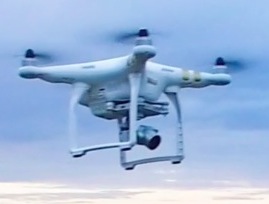
Even South Dakota regulators want less regulation.
The Department of Transportation has proposed Senate Bill 22, a lovely one-sentence measure that exempts small unmanned aircraft (drones!) from state registration requirements.
Under current law, aircraft operators have to register their flying machines with the Department of Transportation and pay an annual fee. For typical drones and any other aircraft that weighs 1,500 pounds or less, that fee is $25 for new to nine-year-old craft and $12.50 for older machines. (I wish they priced the buffet line like that—my little one is ten now!) Owners also pay a 4% tax on the purchase price. Failing to register an aircraft within thirty days after operating it in South Dakota is a Class 2 misdemeanor.
SB 22 says nuts to that for drones weighing less than 55 pounds. So does Secretary of Transportation Darin Bergquist, who reminds Dakota Free Press that drones and model aircraft “are already required to be registered with the FAA.” Thus, says Secretary Bergquist, “requiring their registration as well with the State is redundant and very difficult to enforce.” Recreational drone operators already have to pay the Federal Aviation Administration a $5 registration fee (good for three years!) why add a state fee that, on a new toy, would be fifteen times greater?
Secretary Bergquist says the “vast majority” of unmanned aircraft in South Dakota “are owned by recreational users.” But SB 22 gives commercial drone operators a break, too. One legislator who should like this exemption is Rep. Mathew Wollmann (R-8/Madison), chief operating officer of Saunter Raven, which provides aerial data for agriculture, mapping, and surveying and general aerial imagery. Rep. Wollmann tells Dakota Free Press that SB 22 would “clarify state legislation in regards to unmanned aircraft, and match federal legislation.” Rep. Wollmann says each of Saunter Raven’s aircraft weighs less than ten pounds, so they’ll save a little money.
However, Rep. Wollmann says the big cost for Saunter Raven and other commercial drone operators isn’t state registration fees but insurance. Ten pounds isn’t much weight compared to other aircraft, but drop ten pounds from a hundred feet on someone’s head, and one’s perspective changes. That’s what makes insurers nervous and inflates Saunter Raven’s operating costs.
Rep. Wollmann also notes that commercial drone pilots also need to get a remote pilot certificate, for which testing centers charge around $150.
SB 22 does not exempt small unmanned aircraft from liability for damage from overflight or falling objects or the prohibitions against unauthorized non-emergency landing, buzzing, or operating while buzzed (seriously—don’t drink and drone!). Nor would SB 22 affect local regulations, like Aberdeen’s restrictions on flying drones over most city property and streets.
Maybe this helps with visual inspections of pipelines?
If an annual $25 fee sent to Pierre is hindering mutli-billion-dollar oil companies from writing inspection clauses into their eminent-domain-forced right-of-way agreements, then yes, perhaps.
Ahh, yes….liability.
I don’t think they would be equipped with gear to look for unseen cracks (like acoustics or X-rays), but if drones could help with more visual inspections, then why not?